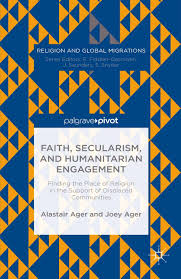Faith, Secularism, and Humanitarian Engagement: Finding the Place of Religion in the Support of Displaced Communities – Alastair Ager & Joey Ager

Author: Alastair Ager & Joey Ager
Publisher: Palgrave Pivot
Year of Publication: 2015
Print Length: 131 pages
Genre: Non-Fiction / Religious Studies, Non-Fiction / Social Science, Non-Fiction / Sociology
Topic: Community, Faith, Humanitarian Action & Humanitarianism, Religion, Secularism, Theology
Emerging questions and concerns about the role of faith in humanitarianism are increasingly being polarized across political and economic interests, particularly and recently evidenced in the highly divided responses to the contemporary ‘refugee crisis’. As such, Ager and Ager’s book is both a timely and urgent contribution to a discourse in need of active and constructive engagement with matters of faith. Indeed, the inclusion of ‘secularism’ in the book’s title is noteworthy in this respect. By offering reflections on faith in humanitarianism as a legitimate field of enquiry, it was necessary for the authors to outline and respond to the dominant secular framing of humanitarianism – a task they effectively undertake. In this book, the authors directly identity the “means to enable more effective humanitarian engagement with local faith communities and their agendas, interests and capacities” (p.vi) in contrast with, and in relation to, dominant secular engagement and understanding.
Comprised of four core chapters, the book takes the reader through a logical sequence of ideas related to the role of faith in humanitarianism, ending with a call for more effective dialogue with faith values, beliefs, instruments, leaders, and communities. Each chapter effectively and creatively begins with an account from the field as experienced by the authors, each highlighting the importance of the faith dimension in humanitarian engagement. For instance, Chapter 1 begins with a recollection of a stakeholder consultation in North Darfur relating to child protection. Having introduced and assessed a wide range of factors and concerns, one of the participants suggested that religious education in their community was essential to facilitate the “proper upbringing of children” (p.2). The authors themselves reflect on their “uncritical acceptance of a secular humanitarian ‘script’”, which had silenced the religious concerns of the beneficiaries of the project, “along with any other meaningful engagement with a perspective seeing children as members of local communities of faith” (p.3). This brief vignette, and others that frame each chapter, help introduce the reader to the missed opportunities or limited effectiveness of humanitarianism in practice, which would otherwise be gained through a deeper and more informed engagement with faith and religion.
Table of Contents
Preface
Prologue
1 Why Humanitarianism Doesn’t Get Religion . . . and Why It Needs To
2 The Place of Faith in Humanitarian Engagement with Displaced Communities
3 Engaging with Theological Reflection to Strengthen Humanitarian Response
4 Towards More Effective Dialogue between Humanitarianism and Religion
Bibliography
Index

Alastair Ager is the Chair of the R2HC Advisory Group. He holds academic appointments as Emeritus Professor of the Institute for Global Health and Development at Queen Margaret University, Edinburgh and as Adjunct Professor with the Department of Population and Family Health at Columbia University. From 2017 to 2020 he served as the Deputy Chief Scientific Adviser to the UK Department for International Development. He has worked as a consultant and researcher across sub-Saharan Africa, south Asia, the Middle-East, Europe and North America, with a broad range of agencies including UNICEF, UNHCR, WHO, Save the Children and World Vision.
Source: https://www.elrha.org/profile/alastair-ager/
More from Alastair Ager in this library, click here.
